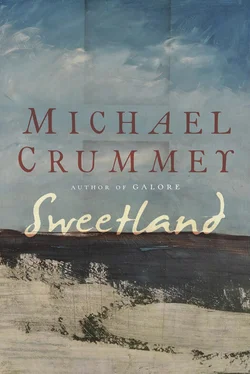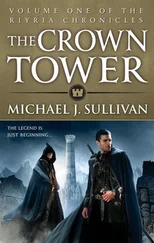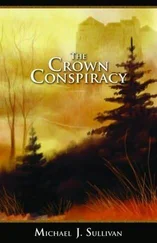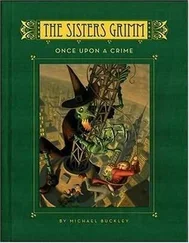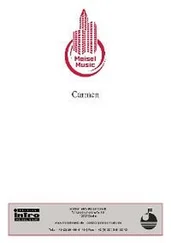He set the chainsaw and gas can and axe and lunch bag on the stagehead and climbed down into his boat, checked over the motor, the VHF.
Jesse was out of breath when he clomped onto the longers. Shirt out of his pants, his face bruised with sleep. A jacket hanging limp in his hand.
Sweetland nodded up to him. “Hand me down the chainsaw,” he said, and a thought struck him. “You’re not planning on bringing anyone along, are you?”
“Just Hollis,” the boy said.
“I’m not taking Hollis.”
“He won’t say nothing.”
“He never liked being on the water when he was alive. I’m not having the fucker in the boat now. Are you coming or not?”
The boy turned away to carry on a hushed conversation with the dead man. Sweetland couldn’t say which way it would go until Jesse picked up the axe and stepped down onto the gunwale.
It was nearly light by the time they turned to the mouth of the cove, pushing out into the whitecaps on the open ocean. A three-hour steam to the bay where he cut his wood and Jesse fell asleep halfway across. Sweetland stood with his face in the wind, watching the shoreline come at him, rising out of the ocean like a slow-moving tidal wave of rock and spruce.
He woke Jesse before he eased into the bay, letting the youngster take the wheel. Steep hills above them, a mix of birch and var among the spruce. “Bring her around over by Nancy’s Rocks,” Sweetland said, and he walked out along the bow, tying up at a rusted iron ring drilled into the granite several lifetimes ago. They stepped off onto the shoreline together, the boy bounding up into the trees, eager as a dog.

The wind came up through the day and the ocean chopped at them as soon as they cleared the bay on the return trip, the boat riding sluggish with a full load of wood. They swung into the lee of Little Sweetland as they passed, to get out of the worst of it a few minutes. The island humpbacked and barren and solitary. Two single-room cabins on the south side of Tilt Cove, satellite dishes screwed to the walls. Sweetland had never seen anyone use those cabins, though they’d been there for years.
“This is where they put the buffaloes,” Jesse said.
Every time they passed Tilt Cove he wanted this fact confirmed and then insisted on hearing the story behind it, the narrative like a toll required to make the passage.
“This is the place.”
“How many people was it lived here?” Jesse asked, which was a surprise to Sweetland. The boy had never shown the slightest interest in the detail before.
“There was almost a hundred lived in there when I was your age,” Sweetland said.
“What happened to them?”
“They was all shifted out by the Smallwood government in the sixties.”
“Where did they go?”
“Here and there,” he said. “Placentia Bay. Burgeo, Hermitage. St. John’s.”
“They’re all dead now.”
Sweetland nodded over that. He didn’t know anymore where the boy’s head was going to take things. “Most of them, I expect.”
“You helped get them ashore,” Jesse said.
“Who’s that?”
“The buffaloes.”
“It was as good as a concert,” he said.
Just home from his first stint in Toronto and working as a deckhand on a schooner shipping dry goods and salt fish along the south coast. The Ceciliene Marie . They sailed across the strait to Cape Breton to pick up the bison, the animals harried into individual containers and a crane lifting them off the dock, setting them into an improvised pen in the hold. Two dozen altogether, most of them yearling females. Two bulls. Unlikely-looking things, a thousand pounds each and most of the weight in the massive head and shoulders, top-heavy on those stick legs. The opposite of icebergs, Sweetland thought, nine-tenths above the water. The animals were walleyed, drugged-up and stinking of shit and fear. Five had died in the railcar on the trip from Manitoba, and Sweetland thought it would be a miracle if any survived the ocean crossing.
It was the wildlife department wanting to add another large game animal to the few in the province landed them there. They planned to set the bison out on Little Sweetland to determine there was no disease risk to local animals, after which the herd was meant to be introduced to the larger island of Newfoundland. Though that step was never taken.
The Ceciliene Marie sailed past Sweetland to overnight in Miquelon. They got drunk there, the wildlife officers and Sweetland, anchored off the last crumb of New France that was still a French territory. It was the only time he’d ever visited the place. The wildlife officers were all Newfoundlanders but for the fellow in charge, an American from Nevada who requested the stop in Miquelon. He took every chance he could get, he said, to spend a night in France.
Wet and mauzy when they arrived at Tilt Cove the following morning. Dozens of people had sailed out from Fortune Bay and the Burin to watch the event, the harbour packed with boats and spectators on the roofs of the houses still standing in the cove.
There was nowhere for the freighter to dock and they anchored off in deeper water, the buffalo loaded into their individual crates to be ferried ashore on a raft built by the wildlife officers. They’d hired Duke Fewer to tow the raft back and forth with his longliner. Sweetland was on the crane for the first dozen transfers, lowering the boxes onto the flat beside the schooner. The bison sedated and more or less quiet as they were hauled onto dry land. Staggering into the open with a stunned air about them, shaking those big rig shoulders and prancing drunkenly up away from the water. The people on the roofs hooting and shouting in disbelief as the mythological creatures wandered about in a forlorn herd, travelling and turning in a huddle, pawing at the sedge moss, sniffing the salt air.
“They aren’t really buffaloes,” Jesse announced.
“Is that right?” Sweetland said.
“Bison aren’t related to water buffaloes or African buffaloes.”
“What is it they’re related to, then?”
“Cows,” Jesse said. “And goats.”
It was some Google search the boy was quoting, a universe of facts at his fingertips. As if, Sweetland thought, he wasn’t tiresome enough on his own. “Be that as it may,” he said, “does Your Highness mind if, for the purposes of this story, I calls them buffalo?”
“I don’t mind,” Jesse said.
Sweetland took a turn on the raft after lunch and he stood with a wildlife officer as each crate was floated in, holding the top of the box to keep his place on the narrow flat. Ashore, he stood at the rear as the officer opened the door. If it needed encouragement to step into the open, Sweetland prodded the animal’s backside with a stick through a custom-made hole.
They’ll come right through the wall if they minds to kick, the officer warned him, so watch yourself.
The animals had all been sedated in the morning but they seemed to be crawling out of that fog as the afternoon wore on. The next-to-last cow was bawling before she was lifted off the schooner, rocking the crate in the air. They cinched the container to the flat, the buffalo’s hooves making the walls shake as they spidered around the outside. The smell and motion of the water seemed to unhinge her altogether and she slammed against the box as they started toward the landing site. All the wooden joints coming loose as the animal panicked inside, the container coming apart before they’d travelled thirty yards toward shore. The wildlife officer pitched into the water as the buffalo pushed for the clear and he grabbed a corner of the raft to hold himself afloat. Sweetland made a wild, stupid lunge for the animal’s tail.
Читать дальше
